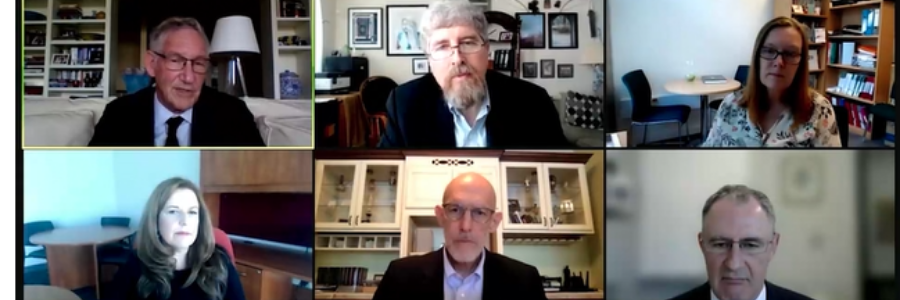COVID-19 Vaccines to the Rescue
Edith Pfister, Ph.D. - May 28, 2021
During this special symposium at the Annual Meeting, panelists Sarah Gilbert, Ph.D., Larry Corey, M.D., Gregory Poland, M.D., Ligia Pinto, Ph.D., Philip Dormitzer, M.D., Ph.D., and Stephen Russell, M.D., Ph.D. talked about lessons learned during the pandemic.

After brief introductions, the Annual Meeting special symposium on COVID-19 vaccines began with Dr. Russell asking the panelists to share some lessons they've learned during the pandemic. Several themes emerged. The first theme was the power of cooperation; cooperation between industry, academia, and government which allowed the rapid development of vaccines. The second was that we need to be ready to work at risk, to start developing vaccines before we are sure we need them, and that is going to cost a lot of money. The overall mood was celebratory, with a touch of caution. The conversation then moved on to discuss a wide range of topics, including candidate selection, correlates of protection, adverse events, and variants. Those topics are summarized below.
How were the candidates selected for the U.S. government effort? Dr. Corey indicated that the decision was made early based on technologies that were scalable and multiple candidates for each of the platform were selected. Companies were chosen that had manufacturing capabilities. Pfizer chose the mRNA platform because they were developing influenza vaccines and it made sense to switch out the influenza sequences with SARS-CoV-2 sequences, and they chose to go it alone because they had already built the capabilities. Despite this, there was a lot of cross-pollination between the programs. Meanwhile, Dr. Gilbert had been working on a MERS vaccine and it made sense to use that platform to develop a SARS-CoV-2 vaccine.
On correlates of protection—antibodies are important, but it is not known yet what levels of antibodies are needed, and correlates of protection will be different depending on time. It seems that high neutralizing antibody titers are not needed because durability of protection is greater than what would be indicated by neutralizing antibodies. Durability is good, but, as expected, tails off. A booster will likely be needed, but what and when that booster will be is not yet clear.
Aside from anaphalaxis, which was anticipated, the most serious side effect is the thrombosis with thrombocytopenia syndrome (TTS) which is showing up with the adenovirus vaccines. It’s a fairly novel side effect, and there had to be millions of doses delivered to see a difference from background. On the plus side, we have robust safety surveillance. The panelists agreed that the risk:benefit ratio changes depending on the situation. In the midst of a global pandemic, you take the vaccine you can get, but that could change when we reach something like a maintenance phase.
As for the variants, serology tests so far have been able to detect all the variants, and neutralization tests show that there is cross reactivity for the variants. The vaccines have good efficacy, especially with regards to severe disease for all the variants of concern. One concern is that places that were thought to have high population immunity, like Seychelles and Brazil, still continue to see cases. Understanding that will be important. Another problem is the large number of immunocompromised individuals, either HIV positive or otherwise immunosuppressed, in whom we are seeing the emergence of variants. Dr. Corey emphasized the importance of vaccination globally. Finally, Dr. Gilbert suggested that different routes of delivery may play an important part in fighting variants by allowing a more robust immune response, particularly in the upper airway.
Dr. Pfister is assistant professor at the University of Massachusetts Medical School and chair of the ASGCT Communications Committee.
Related Articles